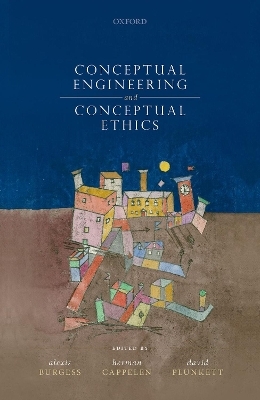
Conceptual Engineering and Conceptual Ethics
Oxford University Press (Verlag)
978-0-19-880185-6 (ISBN)
This is an open access title available under the terms of a CC BY-NC-ND 4.0 licence. It is free to read at Oxford Scholarship Online and offered as a free PDF download from OUP and selected open access locations.
Conceptual engineering and conceptual ethics are branches of philosophy concerned with questions about how to assess and ameliorate our representational devices (such as concepts and words). It's a part of philosophy concerned with questions about which concepts we should use (and why), how concepts can be improved, when concepts should be abandoned, and how proposals for amelioration can be implemented. Central parts of the history of philosophy have engaged with these issues, but the focus of this volume is on applications to work in contemporary philosophy of language and mind, epistemology, gender and race theory, ethics, philosophy of science, and philosophical logic. This is the first volume devoted entirely to conceptual engineering and conceptual ethics. The volume explores the possibilities, benefits, problems, and applications of conceptual engineering and conceptual ethics. It consists of twenty chapters written by leading philosophers.
Alexis Burgess is an independent philosopher based in Los Angeles. Herman Cappelen is Professor of Philosophy at the University of Oslo and at the University of St Andrews. He is editor-in-chief of the journal Inquiry. Cappelen works in all areas of systematic philosophy and has written, co-written, or edited more than ten books and many articles. David Plunkett is Associate Professor of Philosophy at Dartmouth College.
Note to Readers
Contributors
Acknowledgements
1. Introduction: A Guided Tour of Conceptual Engineering and Conceptual Ethics Herman Cappelen and David Plunkett
Abstracts of Chapters
2. Revisionary Analysis without Meaning Change (Or, Could Women Be Analytically Oppressed?) Derek Ball
3. Minimal Substantivity Delia Belleri
4. Reactive Concepts: Engineering the Concept CONCEPT David Braddon-Mitchell
5. Strategic Conceptual Engineering for Epistemic and Social Aims Ingo Brigandt and Esther Rosario
6. Never Say 'Never Say "Never"'? Alexis Burgess
7. Conceptual Engineering: The Master Argument Herman Cappelen
8. Preliminary Scouting Reports from the Outer Limits of Conceptual Engineering Josh Dever
9. Descriptive vs. Ameliorative Projects: The Role of Normative Considerations E. Díaz-León
10. Variance Theses in Ontology and Metaethics Matti Eklund
11. Neutralism and Conceptual Engineering Patrick Greenough
12. Going On, Not in the Same Way Sally Haslanger
13. The Theory-Theory Approach to Ethics Frank Jackson
14. Conceptual Ethics and the Methodology of Normative Inquiry Tristram McPherson and David Plunkett
15. Conceptual Evaluation: Epistemic Alejandro Pérez Carballo
16. Analyzing Concepts and Allocating Referents Philip Pettit
17. The A-project and the B-project Mark Richard
18. Talk and Thought Sarah Sawyer
19. Philosophy as the Study of Defective Concepts Kevin Scharp
20. Linguistic Intervention and Transformative Communicative Disruptions Rachel Katharine Sterken
21. A Pragmatic Method for Normative Conceptual Work Amie L. Thomasson
Index
| Erscheinungsdatum | 03.01.2020 |
|---|---|
| Verlagsort | Oxford |
| Sprache | englisch |
| Maße | 159 x 231 mm |
| Gewicht | 830 g |
| Themenwelt | Geisteswissenschaften ► Philosophie ► Erkenntnistheorie / Wissenschaftstheorie |
| Geisteswissenschaften ► Philosophie ► Metaphysik / Ontologie | |
| Geisteswissenschaften ► Philosophie ► Sprachphilosophie | |
| ISBN-10 | 0-19-880185-8 / 0198801858 |
| ISBN-13 | 978-0-19-880185-6 / 9780198801856 |
| Zustand | Neuware |
| Informationen gemäß Produktsicherheitsverordnung (GPSR) | |
| Haben Sie eine Frage zum Produkt? |
aus dem Bereich

![Was heißt Denken?. Vorlesung Wintersemester 1951/52. [Was bedeutet das alles?] - Martin Heidegger](/media/113619842)
